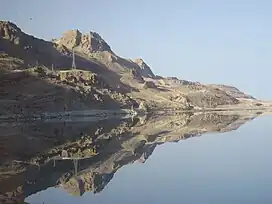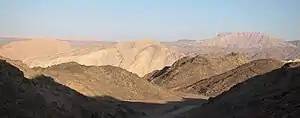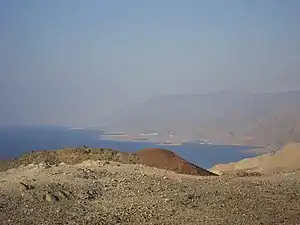Eilat Mountains
The Eilat Mountains (Hebrew: הרי אילת Harei Eilat) are a mountain range within the southern Negev in southern Israel.[1] The ranges of the Timna Valley belong to the Eilat Mountains.[2] Among the central block of mountains, Mount Hezekiah is the highest, followed by Mount Solomon. The mountains overlook the Gulf of Aqaba, which is part of the Red Sea.
| Eilat Mountains | |
|---|---|
 Eilat Mountains reflection in the Gulf of Aqaba, 2007 | |
| Highest point | |
| Elevation | 899 m (2,949 ft) |
| Coordinates | 29°40′02″N 34°54′51″E |
| Geography | |
 Eilat Mountains Southern Negev, Israel | |
| Geology | |
| Mountain type | Igneous rock |
The rock formations in the Eilat mountains are a mix of granite, limestone, and sandstone, that can be described as "extremely colorful".[3]
Etymology
The mountains are named after the nearby city of Eilat and the biblical name of the city Eilot (Eiloth), situated where today the city of Aqaba (Jordan) is located.
Neighboring countries
From the top of Mt. Tzfachot, in the southern tip of the mountain range, visitors may see Egyptian land (via the Sinai Peninsula) when looking southwestward. Visitors looking eastward, across the Gulf of Aqaba, may also see Jordanian land. On clear days, as well, Saudi Arabia can be seen, looking southeastward (also across the Gulf of Aqaba).


Important Bird Area
The ridge of the Eilat Mountains along the western side of the southern Arava Valley forms part of a 60,000 ha Important Bird Area (IBA), as designated by BirdLife International, because it supports populations of various bird species, especially waterbirds and raptors on seasonal migration.[4]
References
- Karst Hydrology: Proceedings of an International Workshop (Workshop W2) Held at Rabat, Morocco, During the Fifth Scientific Assembly of the International Association of Hydrological Sciences (IAHS) : from 23 April to 3 May, 1997. International Association of Hydrological Sciences. 1998. p. 146. ISBN 1901502406.
- Biological Resources and Migration. Springer Science & Business Media. 2013. p. 363. ISBN 3662060833.
- Loren Chemla. "Hiking in Eilat mountains". Retrieved August 17, 2021.
- "Southern Arava valley and Elat mountains". BirdLife Data Zone. BirdLife International. 2021. Retrieved 24 February 2021.